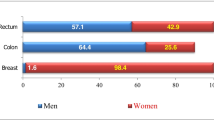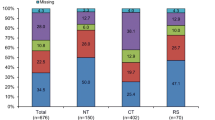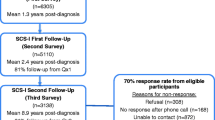Abstract
This study reports preliminary data about the information needs of esophago-gastric cancer survivors and their supporters across diagnosis and treatment by identifying time-specific needs and whether the information provided aligned with the needs at each time point. Survivors (n = 26) and supporters (n = 15) were recruited from a public teaching hospital in South Australia. Both groups provided recall data describing personal information domain challenges at 6 clinically significant time points ranging from diagnosis to > 2 years post diagnosis. Responses were analyzed using descriptive statistics for non-normally distributed data. Needs relating to communication, tests, disease, and the physical effects information domains were consistently high across time and in groups. Supporters’ overall needs were greater than those of survivors, particularly at times of high need. At times of low need, both groups reported information overload. Our results confirm that survivors and supporters require information throughout the cancer trajectory, up to 2 years after diagnosis, and supporters’ needs are likely to be even greater. Results highlight the importance of timely and relevant information provision and provide a basis for the development of resources to empower survivors and supporters to identify and articulate their personal information needs. Patient navigators may provide an avenue to facilitate this approach.
Similar content being viewed by others
Availability of Data and Material
Not applicable.
References
Bray F, Ferley J, Soerjomataram I, Siegel RL, Torre LA, Jemal A (2018) Global cancer statistics 2018: GLOBOCAN estimates of incidence and mortality worldwide for 36 cancers in 185 countries. CA Cancer J Clin 68:394–424. https://doi.org/10.3322/caac.21492
Weisman AD, Worden JW (1977) The existential plight in cancer: significance of the first 100 days. Int J Psychiatry Med 7:1–15. https://doi.org/10.2190/UQ2G-UGV1-3PPC-6387
Lazarus RS, Folkman S (1984) Stress, appraisal, and coping. Springer Publishing Co., New York, pp 226–258
Revenson T, Pranikoff J (2005) A contextual approach to treatment decision making among breast cancer survivors. Health Psychol 24:S93–S98. https://doi.org/10.1037/0278-6133.24.4.S93
Fennell KM, Heckel L, Wilson C, Byrnes M, Livingston PM (2016) How calls from carers, friends and family members of someone affected by cancer differ from those made by people diagnosed with cancer; analysis of 4 years of south Australian Cancer Council Helpline data. Support Care Cancer 24:2611–2618. https://doi.org/10.1007/s00520-015-3069-y
Galloway S, Graydon J, Harrison D, Evans-Boyden B, Palmer-Wickham S, Burlein-Hall S, Rich-van der Bij L, West P, Blair A (1997) Informational needs of women with a recent diagnosis of breast cancer: development and initial testing of a tool. J Adv Nurs 25:1175–1183. https://doi.org/10.1046/j.1365-2648.1997.19970251175.x
McNair AG, Brookes ST, Kinnersley P, Blazeby JM (2013) What surgeons should tell patients with oesophago-gastric cancer: a cross sectional study of information needs. Eur J Surg Oncol 39:1278–1286. https://doi.org/10.1016/j.ejso.2013.08.005
Boyes A, Girgis A, Lecathelinais C (2009) Brief assessment of adult cancer patients' perceived needs: development and validation of the 34-item supportive care needs survey (SCNS-SF34). J Eval Clin Pract 15:602–606. https://doi.org/10.1111/j.1365-2753.2008.01057.x
Redman BK (2003) Measurement tools in patient education. Springer Publishing Co., New York, pp 249–255
Quillin JM, Tracy K, Ancker JS, Mustian KM, Ellington L, Viswanath V, Miller SM (2009) Healthcare system approaches to cancer patient communication. J Health Commmun 14(Suppl 1):85–94. https://doi.org/10.1080/10810730902806810
Ankem K (2006) Factors influencing information needs among cancer patients: a meta-analysis. Libr Inf Sci Res 28:7–23. https://doi.org/10.1016/j.lisr.2005.11.003
Mistry A, Wilson S, Priestman T, Damery S, Haque MS (2010) How do the information needs of cancer patients differ at different stages of the cancer journey? A cross-sectional survey. JRSM Short Rep 1:30–10. https://doi.org/10.1258/shorts.2010.010032
Jo HS, Park K, Jung SM (2019) A scoping review of consumer needs for cancer information. Patient Educ Couns 102:1237–1250. https://doi.org/10.1016/j.pec.2019/02.004
Deshields TL, Rihanek A, Potter P, Zhang Q, Kuhrik M, Kuhrik N, O'Neill J (2012) Psychosocial aspects of caregiving: perceptions of cancer patients and family caregivers. Support Care Cancer 20:349–356. https://doi.org/10.1007/s00520-011-1092-1
Matsuyama RK, Kuhn LA, Molisani A, Wilson-Genderson MC (2013) Cancer patients’ information needs the first nine months after diagnosis. Patient Educ Couns 90:96–102. https://doi.org/10.1016/j.pec.2012.09.009
Liao MN, Chen SC, Chen SC, Lin YC, Hsu YH, Hung HC, Wang CH, Chen MF, Jane SW (2012) Changes and predictors of unmet supportive care needs in Taiwanese women with newly diagnosed breast cancer. Oncol Nurs Forum 39:E380–E389. https://doi.org/10.1188/12.ONF.E380-E389
Ruben BD (2016) Communication theory and health communication practice: the more things change, the more they stay the same. Health Commun 31:1–11. https://doi.org/10.1080/10410236.2014.923086
Tho PC, Ang E (2016) The effectiveness of patient navigation programs for adult cancer patients undergoing treatment: a systematic review. JBI Database System Rev Implement Rep 14:295–321. https://doi.org/10.11124/jbisrir-2016-2324
Mills ME, Sullivan K (2000) Patients with operable oesophageal cancer; their experience of information-giving in a regional thoracic unit. J Clin Nurs 9:236–246. https://doi.org/10.1046/j.1365-2702.2000.00359.x|
Andreassen S, Randers I, Naslund E, Stockeld D, Mattiasson AC (2007) Information needs following a diagnosis of oesophageal cancer; self-perceived information needs of patients and family members compared with the perceptions of healthcare professionals: a pilot study. Eur J Cancer Care (Engl) 16:277–285. https://doi.org/10.1111/j.1365-2354.2006.00742.x
Wong RKS, Franssen E, Szumacher E, Connolly R, Evans M, Page B, Chow E et al (2002) What do patients living with advanced cancer and their carers want to know? - a needs assessment. Support Care Cancer 10:408–415. https://doi.org/10.1007/s00520-002-0354-3
Husson O, Mols F, van de Poll-Franse L (2011) The relation between information provision and health-related quality of life, anxiety and depression among cancer survivors: a systematic review. Ann Oncol 22:761–772. https://doi.org/10.1093/annonc/mdq413
Ley P (1979) Memory for medical information. Br J Soc Clin Psychol 18:245–255. https://doi.org/10.1111/j.2044-8260.1979.tb00333.x|
van Osch M, Sep M, van Vliet L, Van Dulmen S, Bensing J (2014) Reducing patients’ anxiety and uncertainty, and improving recall in bad news situations. Health Psychol 33:1382–1390. https://doi.org/10.1037/hea0000097
Kessels R (2003) Patients’ memory for medical information. J R Soc Med 96:219–222. https://doi.org/10.1258/jrsm.96.5.219
Fletcher C, Flight I, Chapman J, Fennell K, Wilson C (2017) The information needs of adult cancer survivors across the cancer continuum: a scoping review. Patient Educ Couns 100:383–410. https://doi.org/10.1016/j.pec.2016.10.008
Winner M, Wilson M, Rannekleiv-Kelly S, Smith TJ, Pawlik TM (2017) A singular hope: how the discussion around cancer surgery sometimes fails. Ann Surg Oncol 24:31–37. https://doi.org/10.1245/s10434-016-5564-x
Pinto E, Cavallini F, Saadeh LM, Bellissimo MC, Alfieri R, Mantoan S, Cagol M, Castoro C, Scarpa M (2018) Potential curability and perception of received information in esophageal cancer patients. Support Care Cancer 26:1807–1814. https://doi.org/10.1007/s00520-017-4005-0
Acknowledgements
We sincerely thank all participants for their support and taking the time to complete the surveys.
Funding
This work was supported by the Cancer Council South Australia’s Beat Cancer Project on behalf of its donors and the State Government of South Australia through the Department of Health together with the support of the Flinders Medical Centre Foundation, its donors and partners.
Author information
Authors and Affiliations
Contributions
(Following CRediT Taxonomy) Conceptualization: Ingrid Flight, Janine Chapman, Carlene Wilson. Methodology: Ingrid Flight, Janine Chapman, Chris Christensen, Bogda Koczwara, Carlene Wilson. Formal analysis and investigation: Ingrid Flight, Janine Chapman, Nathan Harrison. Writing, original draft: Ingrid Flight, Nathan Harrison. Writing, review and editing: Ingrid Flight, Janine Chapman, Nathan Harrison, Jeff Bull, Chris Christensen, Bogda Koczwara, Carlene Wilson. Project administration: Ingrid Flight. Funding acquisition: Ingrid Flight. Resources: Nathan Harrison, Jeff Bull, Chris Christensen. Data curation: Nathan Harrison, Jeff Bull. Final approval of submitted version: Janine Chapman, Nathan Harrison, Jeff Bull, Chris Christensen, Bogda Koczwara, Carlene Wilson. Supervision: Carlene Wilson.
Corresponding author
Ethics declarations
Conflict of Interest
The authors declare they have no conflict of interest.
Code Availability
Not applicable.
Additional information
Publisher’s Note
Springer Nature remains neutral with regard to jurisdictional claims in published maps and institutional affiliations.
Rights and permissions
About this article
Cite this article
Flight, I.H., Chapman, J., Harrison, N.J. et al. Mapping Information Needs over the Diagnosis, Treatment, and Survivorship Trajectory for Esophago-gastric Cancer Patients and Their Main Supporters: a Retrospective Survey. J Canc Educ 37, 655–661 (2022). https://doi.org/10.1007/s13187-020-01862-7
Published:
Issue Date:
DOI: https://doi.org/10.1007/s13187-020-01862-7




